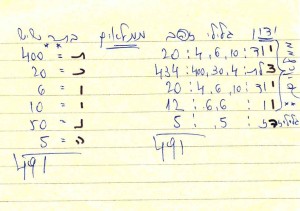 What is the purpose of time? Psalm 90 attributed to Moses gives us a hint in verse 12. “Teach us to number our days that we may get a heart of wisdom”. This reminds me of the 2012 movie “A Thousand Words” where a shady character “Jack” played by Eddie Murphy is cursed to die as soon as he mutters 1000 words. He begins to pick his words very thoughtfully and sparingly to no avail until he learns from a guru that to remove the curse he must make peace with all relationships. One broken relationship stood out from all the rest – Jack was angry at his father for leaving his mother when he was born. With only three words left, Jack’s life is redeemed when he finds his father and tells him, “I forgive you”. [Read more…] about Timelessness
What is the purpose of time? Psalm 90 attributed to Moses gives us a hint in verse 12. “Teach us to number our days that we may get a heart of wisdom”. This reminds me of the 2012 movie “A Thousand Words” where a shady character “Jack” played by Eddie Murphy is cursed to die as soon as he mutters 1000 words. He begins to pick his words very thoughtfully and sparingly to no avail until he learns from a guru that to remove the curse he must make peace with all relationships. One broken relationship stood out from all the rest – Jack was angry at his father for leaving his mother when he was born. With only three words left, Jack’s life is redeemed when he finds his father and tells him, “I forgive you”. [Read more…] about Timelessness
The Dark Night of the Soul
The term “Dark Night of the Soul” is the title of a poem by Saint John of the Cross, a 16th century friar of the monastic order of Carmelites in Spain. He was a leading Spanish poet and religious reformer in his time. The Dark Night of the Soul is a message about travail and hope in the journey of the soul towards union with God. It represents one of many threads of esoteric belief winding through the tapestry of [Read more…] about The Dark Night of the Soul
The Four Living Creatures and The Gospels
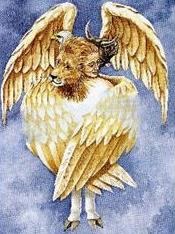 The passages in Ezekiel describing The Four Living Creatures are mysterious and phantasmagorical. They are open to interpretations of all varieties, exoteric and esoteric. The Books of Daniel and Revelation also contain surreal images, but most of them are not as complex and elusive, and the symbolism is usually more obvious. For instance, Daniel’s vision of the various kingdoms that arise to rule his known world can be related to historical kingdoms. [Read more…] about The Four Living Creatures and The Gospels
The passages in Ezekiel describing The Four Living Creatures are mysterious and phantasmagorical. They are open to interpretations of all varieties, exoteric and esoteric. The Books of Daniel and Revelation also contain surreal images, but most of them are not as complex and elusive, and the symbolism is usually more obvious. For instance, Daniel’s vision of the various kingdoms that arise to rule his known world can be related to historical kingdoms. [Read more…] about The Four Living Creatures and The Gospels
The Complete Idiot’s Guide to Gematria
Although it is not too clear from the title whether this guide was written by or for The Complete Idiot, I will be honest; my credentials for writing this post are dismal. I am a techie type who discovered my intuitive side only months ago, and right after that I tried to analyze everything I knew about intuition to death before I realized you cannot get it that way. To really succeed at Gematria, someone must have a high Intuitive Intelligence Quotient (IIQ), because once you are done with all the calculating, the real trick will be relying on your intuition to make meaningful interpretations. [Read more…] about The Complete Idiot’s Guide to Gematria
Understanding the Messianic Prophecies, Part IV
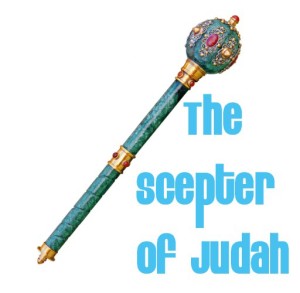 “The scepter shall not depart from Judah… until Shiloh come.” Genesis 49:8-10 This prophetic statement was included in a blessing given by Jacob, just before he died, to his third son Judah. The blessing began “Judah, thou art he whom they brothers shall praise”, and continued the bestowal of the Messianic lineage by divine selection rather than by natural birth rite. Judah had no special moral qualifications for this blessing. He had conspired with eight of his brothers to kill his half-brother, Joseph. He had illicit sexual relations with his daughter-in-law, Tamar. He was not the oldest like Reuben. He was not the favorite like Joseph. And yet the scepter, the symbol of rulership, was given to him. [Read more…] about Understanding the Messianic Prophecies, Part IV
“The scepter shall not depart from Judah… until Shiloh come.” Genesis 49:8-10 This prophetic statement was included in a blessing given by Jacob, just before he died, to his third son Judah. The blessing began “Judah, thou art he whom they brothers shall praise”, and continued the bestowal of the Messianic lineage by divine selection rather than by natural birth rite. Judah had no special moral qualifications for this blessing. He had conspired with eight of his brothers to kill his half-brother, Joseph. He had illicit sexual relations with his daughter-in-law, Tamar. He was not the oldest like Reuben. He was not the favorite like Joseph. And yet the scepter, the symbol of rulership, was given to him. [Read more…] about Understanding the Messianic Prophecies, Part IV
Understanding the Messianic Prophecies, Part III
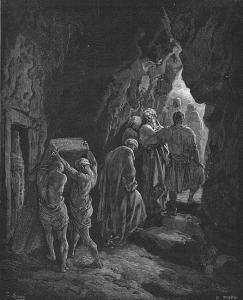 In this series we will continue to perform a temporary “about face” in our quest to discover wisdom. By reassessing the historical and literal validity of selected parts of the bible, we shall try to answer four questions. (1) Is the Messiah of the Gospels merely of allegorical importance, as one sect of the first century Gnostics proposed? (2) Does history and archeology regarding the Jewish people validate the existence of a flesh and blood Messiah? (3) Did this Messiah atone for the sins of others? (4) Do historical and allegorical messages in the bible oppose or complement each other? I shall explain later why the “about face” is necessary and only temporary. [Read more…] about Understanding the Messianic Prophecies, Part III
In this series we will continue to perform a temporary “about face” in our quest to discover wisdom. By reassessing the historical and literal validity of selected parts of the bible, we shall try to answer four questions. (1) Is the Messiah of the Gospels merely of allegorical importance, as one sect of the first century Gnostics proposed? (2) Does history and archeology regarding the Jewish people validate the existence of a flesh and blood Messiah? (3) Did this Messiah atone for the sins of others? (4) Do historical and allegorical messages in the bible oppose or complement each other? I shall explain later why the “about face” is necessary and only temporary. [Read more…] about Understanding the Messianic Prophecies, Part III
Understanding the Messianic Prophecies, Part II
 The Jewish people have always had a longing for Messiah. In Part I of this series we learned that the Hebrew prophets spoke of two archetype Messiahs – the Suffering Servant, one who would save them from the war against human sin within, and the Triumphant King, one who would save them from the political war without. In much of Jewish literature outside the bible, including the Talmud and the Targums (sermons delivered in the common language of the people) the rabbis speculated about how these two contrasting depictions of the Messiah would manifest. [Read more…] about Understanding the Messianic Prophecies, Part II
The Jewish people have always had a longing for Messiah. In Part I of this series we learned that the Hebrew prophets spoke of two archetype Messiahs – the Suffering Servant, one who would save them from the war against human sin within, and the Triumphant King, one who would save them from the political war without. In much of Jewish literature outside the bible, including the Talmud and the Targums (sermons delivered in the common language of the people) the rabbis speculated about how these two contrasting depictions of the Messiah would manifest. [Read more…] about Understanding the Messianic Prophecies, Part II
Understanding the Messianic Prophecies, Part I
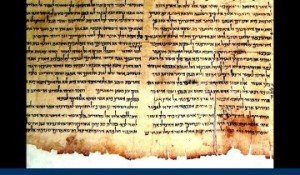 By the time Jesus is said to have appeared in Jerusalem, the rabbis knew that the scriptures described two archetypes of Messiah – a humiliated Messiah, known as the Suffering Servant, who in the tradition of the prophets would be scorned by his peers while attempting to touch men’s hearts regarding the issues of sin; and an exalted Messiah, known as the Triumphant King, who in the tradition of an idealized King David, would restore Israel to world prominence and also usher in a Golden Age where the lion would sit down with the lamb. [Read more…] about Understanding the Messianic Prophecies, Part I
By the time Jesus is said to have appeared in Jerusalem, the rabbis knew that the scriptures described two archetypes of Messiah – a humiliated Messiah, known as the Suffering Servant, who in the tradition of the prophets would be scorned by his peers while attempting to touch men’s hearts regarding the issues of sin; and an exalted Messiah, known as the Triumphant King, who in the tradition of an idealized King David, would restore Israel to world prominence and also usher in a Golden Age where the lion would sit down with the lamb. [Read more…] about Understanding the Messianic Prophecies, Part I
Krishna’s 16,000 Wives?
 When I was younger, the average Westerner knew very little about the religions of Southeast Asia. One day, baldheaded devotees in strange clothing appeared in our airports chanting “Hare Krishna”. Then came the meditation instructors and yoga teachers. One Westerner made a fortune publishing the Kama Sutra. And in those days, Gandhi inspired us all.
When I was younger, the average Westerner knew very little about the religions of Southeast Asia. One day, baldheaded devotees in strange clothing appeared in our airports chanting “Hare Krishna”. Then came the meditation instructors and yoga teachers. One Westerner made a fortune publishing the Kama Sutra. And in those days, Gandhi inspired us all.
Our Western culture has greatly benefited from the infusion of Southeast Asian culture into our own, and yet we still do not know much about the native religion and its sacred scripture. [Read more…] about Krishna’s 16,000 Wives?
On the Sacred Path with Gilgamesh and Enkidu
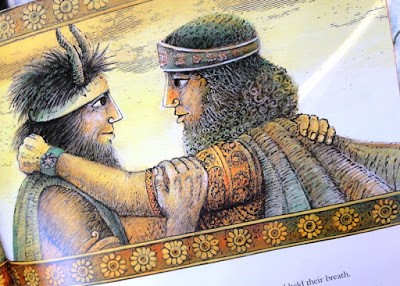 How much of the bible is derived from stories told by cultures more ancient than itself? In my previous post “The Flood: Biblical vs. Mesopotamian Narratives” we found so many similarities in detail between Noah’s Ark and the flood story in the Epic of Gilgamesh. The dimensions of the vessel, the use of birds to tell when the land became dry, the performance of sacrificial rites after landing, and so on, were all alike. The moral of the stories differ, of course. Noah and his family learn about God’s grace amidst judgment, whereas Gilgamesh learns humility in light of man’s earthly mortality. [Read more…] about On the Sacred Path with Gilgamesh and Enkidu
How much of the bible is derived from stories told by cultures more ancient than itself? In my previous post “The Flood: Biblical vs. Mesopotamian Narratives” we found so many similarities in detail between Noah’s Ark and the flood story in the Epic of Gilgamesh. The dimensions of the vessel, the use of birds to tell when the land became dry, the performance of sacrificial rites after landing, and so on, were all alike. The moral of the stories differ, of course. Noah and his family learn about God’s grace amidst judgment, whereas Gilgamesh learns humility in light of man’s earthly mortality. [Read more…] about On the Sacred Path with Gilgamesh and Enkidu
The Flood: Biblical vs. Mesopotamian Narratives
 We are all familiar with the story of The Flood in the Hebrew Bible. But this is not the first account of a catastrophic near-extinction event in recorded human history. The Mesopotamians who lived centuries before the book of Genesis was written had their very own captivating flood story similar to Genesis in many ways, but told in the style and traditions of their own rich and unique culture. [Read more…] about The Flood: Biblical vs. Mesopotamian Narratives
We are all familiar with the story of The Flood in the Hebrew Bible. But this is not the first account of a catastrophic near-extinction event in recorded human history. The Mesopotamians who lived centuries before the book of Genesis was written had their very own captivating flood story similar to Genesis in many ways, but told in the style and traditions of their own rich and unique culture. [Read more…] about The Flood: Biblical vs. Mesopotamian Narratives
Do Unto Others
 While mailing holiday packages at the US post office this season, I noticed a display of greeting cards for sale. One card in particular caught my eye. On the cover it read:
While mailing holiday packages at the US post office this season, I noticed a display of greeting cards for sale. One card in particular caught my eye. On the cover it read:
“Sometimes I wonder why I put up with you.”
On the inside of the card it read:
“Oh yeah, now I remember, you put up with me!” [Read more…] about Do Unto Others
How Are We to Determine Truth: Part 1 – The Dream
 Allow me to share in a little holiday fun with an amusing account of a dream. Never mind the poking and teasing in it. No disrespect is meant to the serious posts on signs and numerology. I just want to make sure that is absolutely clear. We just need to laugh at ourselves sometimes. So here it is. [Read more…] about How Are We to Determine Truth: Part 1 – The Dream
Allow me to share in a little holiday fun with an amusing account of a dream. Never mind the poking and teasing in it. No disrespect is meant to the serious posts on signs and numerology. I just want to make sure that is absolutely clear. We just need to laugh at ourselves sometimes. So here it is. [Read more…] about How Are We to Determine Truth: Part 1 – The Dream

